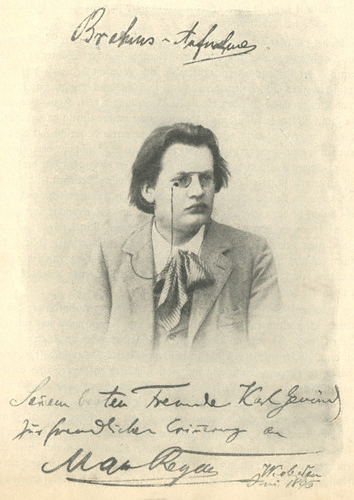1. Wiesbaden

In February Reger attends a concert of the Museumsgesellschaft in Frankfurt, in which Richard Strauss conducts his Till Eulenspiegels lustige Streiche and Ferruccio Busoni appears as the soloist in a piano concerto by Anton Rubinstein; he makes personal acquaintance with both composers. A performance of his Piano Trio in B minor, Op. 2, at the Tonkünstler Assembly of the Allgemeiner Deutscher Musikverein (ADMV) in Leipzig is rejected because he has not yet attained sufficient merit on behalf of Franz Liszt, the founder of the ADMV. Reger sends his Suite E minor for organ, Op. 16, to Johannes Brahms and asks him to accept the dedication of his first Symphony; Brahms accepts in a friendly manner and sends his photography. Augener & Co. refuse to print the piano four-hands transcription of the Suite for organ, but publishes further Bach transcriptions (RWV Bach-B2). In June 187 pages of a Piano Concerto in F minor (WoO I/4) are written for Eugen d'Albert, in July a Symphony in B minor (WoO I/5) is largely finished. Both works are announced to Augener's for August/September; their fate is unknown.
In October Reger begins his military service as a one-year volunteer at the end of the possible deferral period. Since this results in considerable costs, but the works calculated for financing (Symphony in B minor and Piano Concerto in F minor) remain unpublished and the opportunities to earn money through teaching and composition are lost, Reger falls into ever deeper debt: “Nobody gives me a penny; I stand alone; and no one cares about me; on the contrary, my gentlemen colleagues (the gentlemen musicians) are doing everything to bring me down” (letter of 19 December to August Döring). Unfit for military service, he spends the first few weeks (from mid-October) in the hospital due to an ankle infection. However, the hoped-for unfitness for service is not determined; Reger has to serve the entire period: “But I won't be discouraged; I live and die for my holy, sacred art – and if I don't find any recognition, one should just dig me in like that” (ibid.).
Postal items from this year whose sender or addressee is Max Reger.
Images from the Max Reger Foto Gallery that originate from this year and have a direct reference to Max Reger.
Reference
Max Reger Biography – 1896, in: Max-Reger-Portal, www.maxreger.info/biography/1896, Max Reger Biography Data, V. 3.2.0, last check: 5th January 2026.